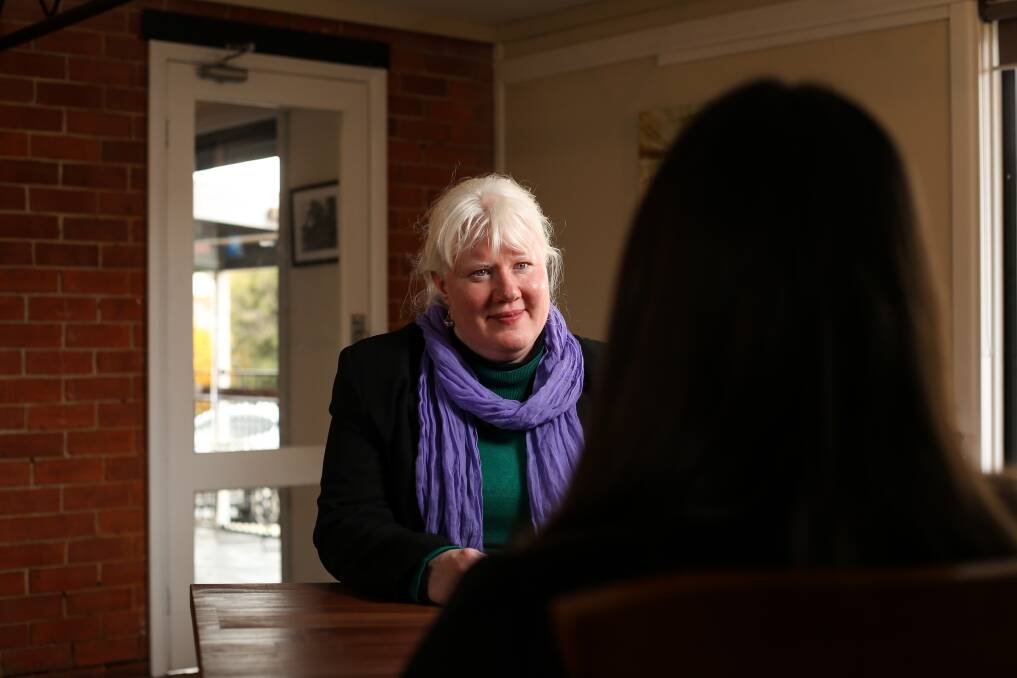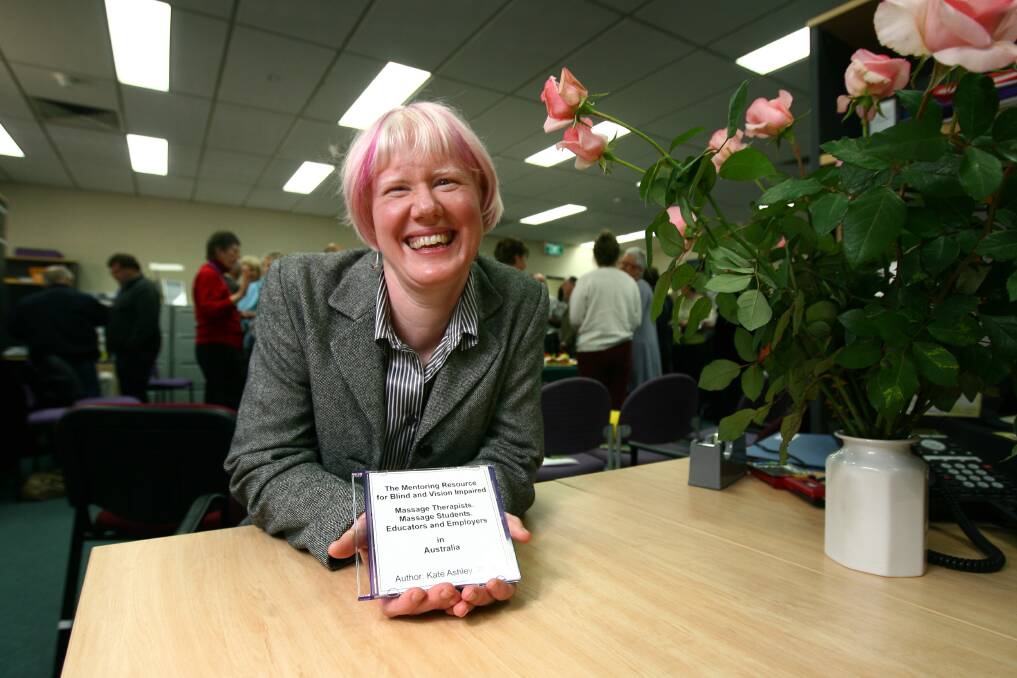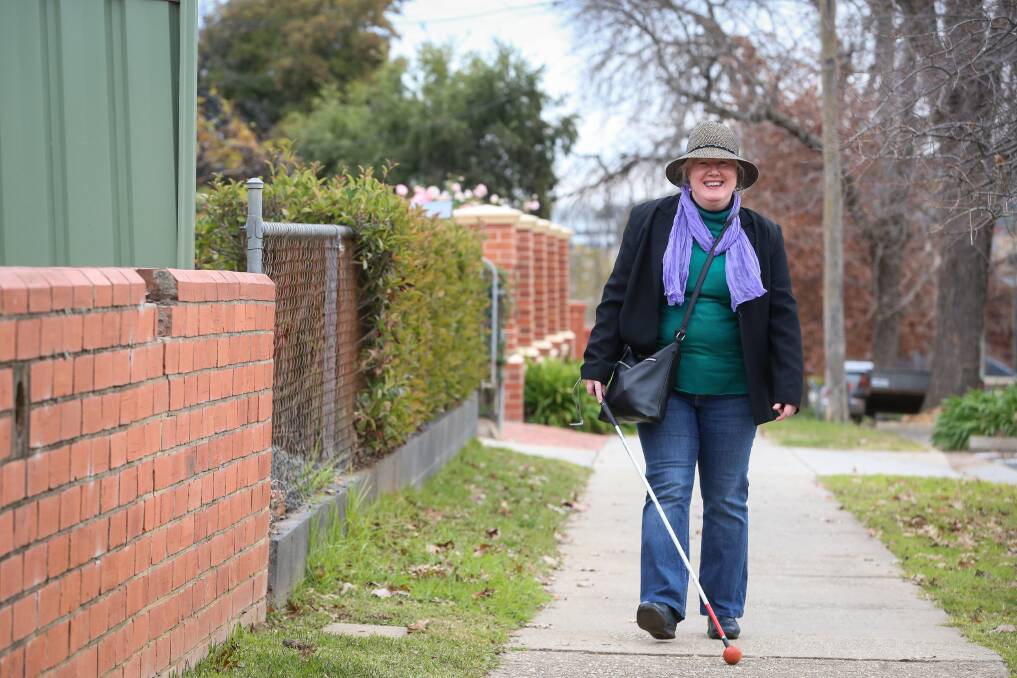
Doing things the way everyone else does them has never worked for Kate Ashley.
Subscribe now for unlimited access.
or signup to continue reading
As a 14-year-old, she was the one talking accessibility at her school.
At 23, completing her first university degree, Kate sought out librarians at Charles Sturt University in Wagga so she could find the books she needed.
And now she is taking a different path in counselling.
"I'm kind of doing it the wrong way around - usually, you're employed for a few years and then you start a private practice," Kate joked.
"But those opportunities are often not there for someone with a disability, so I'm just doing it my way.
"It worked for me the last time."
After 15 years working as a massage therapist on the Border, Kate, who is legally blind, has launched NIMUE Counselling.
Ironically, the very profession that turned her away from her Bachelor of Social Welfare 26 years ago is the one she has found her life's passion in.
"I was going to go into welfare in schools ... simply because my school life had been pretty challenging," Kate said.
"I had a challenging experience working in counselling when I finished my degree, due to the workplace culture.
"That got me to a point where I thought, 'I really don't want anything to do with this', but I want to be involved in helping people.
"Massage therapy was still another way of helping people heal."
Kate saw incredible gains in the well-being of people through a volunteer-run clinic at St John's Anglican Church in Wodonga, which she launched in 2011.
The Revive Wellbeing Community Clinic offered massages, haircuts, kinesiology and more at a low cost with its client base exceeding 200 in the three years Kate ran it.
"When I was working as a massage therapist, I saw the benefit that massage gave to people who were stressed, who were lonely, and who had a lot of pain," she said.
"I saw how difficult it was when they could only afford to come to you sometimes.

"Initially, Revive was for people who were homeless but it evolved to people just doing it tough, because I think challenges come in many forms. "I've often struggled financially because of difficulty finding work; I know how hard it is."
Kate and many other people with disabilities still find major gaps in employers' accessibility and inclusion practices.
"Because of my vision impairment, it's really important to have systems and information that's accessible," she said.
"If I had a different disability, it might be something else, but that's been my main barrier to to employment.
"It's also people's fear of what it is to be legally blind.
"It's people kindly saying to you that they think that's the worst thing they could ever experience.
"They're unaware they've totally dismissed my entire way of being.
"You can still have a rich life, it just might not be the same as narrower ways others define a rich life."
There is no longer any excuse for employers to fail to include people of all abilities, Kate said, particularly when she reflects on the technology advances since the 20th Century.
Kate used a typewriter given to her by a friend as a teenager, and her family had a closed circuit television (which magnifies the projection) donated by her local Lions Club.
She used to "hope for the best" when finding library books, which were still a challenge to read, and it wasn't until her second degree, in secondary education, that computers came into the picture.
"With my original degrees, I was nearly always six weeks behind in readings, by the time I got adapted materials back," Kate said.
"So I worked really hard.
"Now, everything is on the computer, but not only that - for the first time in my life, I have had access to research materials and information that I've never had access to."
Kate began a Master of Counselling and Psychotherapy with the Australian College of Applied Psychology last year, soon after completing her Graduate Diploma in Counselling.
She is also working with the College as an AccessAbility coach.
"I tutor tertiary students with disabilities and advocate on access and support, if required," Kate said.
"It's been really good, because I'm learning a lot about needs of people with different abilities.
"Obviously with having significant a vision impairment, there's a lot of commonalities.
"I use different technologies to a student who is totally blind, but there are still similar access issues and similar frustrations.
"I encourage my students to self-advocate, because those are skills they need."
Kate's ability to self-advocate has grown since she was the only kid at school with a vision impairment and albinism.
"It was before all the SunSmart stuff came in at schools, and it was when being bronzed and good at sport was what you did," she said.
"So it was really tough.
"I did well academically ... but it was not easy and unfortunately I still hear stories of kids who are excluded and bullied because the look different or have different abilities.
"People don't realise the damage that does; if you have that for the most of your childhood, that can impact your development."
Being on the receiving end of counselling has helped Kate move on from that trauma.

"It's important for counsellors to get counselling as well because you've got to know what it's like to be in that chair, to be really unsure what the counsellor is doing and why they're doing it," she said.
"You have to adapt to each client.
"But it's about helping people realise that, whatever is happening in their lives, they can still be fully free beings.
"Other people might affect you, but it's about what you do with your responses, and that's hard for a lot of people."
At a time when more mental health workers are needed, Kate thinks the counselling profession could do with some of their own self-reflection.
"There's an absolute need for more counsellors, but it's not easy to actually get a counselling position," she said.
"The counseling profession is privileged in that way; when they talk about disability in counselling texts, it seems to be a long way behind how OTs and social workers talk about disability.
"We all have privilege in different areas of our lives, and we're not aware."
So, it was always going to be the case that Kate stayed self-employed.
"I loved massage therapy very much - I did get very sick of the laundry - but I developed issues with my back, so I knew I wasn't going to be able to do it forever," she said.
"With counselling, you still help people, but you get to do some more direct work with people's well-being and with their psyches, to support them as they seek to grow and manage their own problems."
Kate has sent out flyers to community centres about her business and will work from the Glenecho Community Centre in Glenroy.
She intends to keep her prices low to ensure her services are accessible to all.
"It doesn't matter how unwell you are, everyone has potential to make a change and grow, if they want to," Kate said.
"I understand that people have different struggles and different experiences in life.
"But everybody has the potential to change and grow. It boils down to whether you want to."
Kate is excited to get her first client on the books, and is also looking forward to a major life development later this year.
"I'll be getting a guide dog," she said.
IN OTHER NEWS:
"COVID really knocked a lot of my confidence, so the guide dog will be a great help, and will bring companionship and confidence.
"I intend to bring the dog into the therapy room, as a calming presence for both of us."
Kate welcomes contact from those interested in being a client of NIMUE Counselling - which stands for Nurturing, Innovative, Mindful, Unique and Evolutionary.
You might even see her on the streets of Albury come September, completing her guide dog training.
Just make sure to approach her from the front, and say 'Hello' before anything else. We are in 2021, after all.
- NIMUE Counselling: 0419004407 or kate@nimuecounselling.com.au
Kate used a typewriter given to her by a friend as a teenager, and her family had a closed circuit television (which magnifies the projection) donated by her local Lions Club.
She used to "hope for the best" when finding library books, which were still a challenge to read, and it wasn't until her second degree, in secondary education, that computers came into the picture.
"With my original degrees, I was nearly always six weeks behind in readings, by the time I got adapted materials back," Kate said.
"So I worked really hard.
"Now, everything is on the computer, but not only that - for the first time in my life, I have had access to research materials and information that I've never had access to."
Kate began a Master of Counselling and Psychotherapy with the Australian College of Applied Psychology last year, soon after completing her Graduate Diploma in Counselling.
She is also working with the College as an AccessAbility coach.
"I tutor tertiary students with disabilities and advocate on access and support, if required," Kate said.
"It's been really good, because I'm learning a lot about needs of people with different abilities.
"Obviously with having significant a vision impairment, there's a lot of commonalities.
"I use different technologies to a student who is totally blind, but there are still similar access issues and similar frustrations.
"I encourage my students to self-advocate, because those are skills they need."
Kate's ability to self-advocate has grown since she was the only kid at school with a vision impairment and albinism.
"It was before all the SunSmart stuff came in at schools, and it was when being bronzed and good at sport was what you did," she said.
"So it was really tough.
"I did well academically ... but it was not easy and unfortunately I still hear stories of kids who are excluded and bullied because the look different or have different abilities.
"People don't realise the damage that does; if you have that for the most of your childhood, that can impact your development."
Being on the receiving end of counselling has helped Kate move on from that trauma.
"It's important for counsellors to get counselling as well because you've got to know what it's like to be in that chair, to be really unsure what the counsellor is doing and why they're doing it," she said.
"You have to adapt to each client.
"But it's about helping people realise that, whatever is happening in their lives, they can still be fully free beings.
"Other people might affect you, but it's about what you do with your responses, and that's hard for a lot of people."
At a time when more mental health workers are needed, Kate thinks the counselling profession could do with some of their own self-reflection.
"There's an absolute need for more counsellors, but it's not easy to actually get a counselling position," she said.
"The counseling profession is privileged in that way; when they talk about disability in counselling texts, it seems to be a long way behind how OTs and social workers talk about disability.
"We all have privilege in different areas of our lives, and we're not aware."
So, it was always going to be the case that Kate stayed self-employed.
"I loved massage therapy very much - I did get very sick of the laundry - but I developed issues with my back, so I knew I wasn't going to be able to do it forever," she said.
"With counselling, you still help people, but you get to do some more direct work with people's well-being and with their psyches, to support them as they seek to grow and manage their own problems."
Kate has sent out flyers to community centres about her business and will work from the Glenecho Community Centre in Glenroy.
She intends to keep her prices low to ensure her services are accessible to all.
"It doesn't matter how unwell you are, everyone has potential to make a change and grow, if they want to," Kate said.
"I understand that people have different struggles and different experiences in life.
"But everybody has the potential to change and grow. It boils down to whether you want to."
Kate is excited to get her first client on the books, and is also looking forward to a major life development later this year.
"I'll be getting a guide dog," she said.
"COVID really knocked a lot of my confidence, so the guide dog will be a great help, and will bring companionship and confidence.
"I intend to bring the dog into the therapy room, as a calming presence for both of us."
Kate welcomes contact from those interested in being a client of NIMUE Counselling - which stands for Nurturing, Innovative, Mindful, Unique and Evolutionary.
You might even see her on the streets of Albury come September, completing her guide dog training.
Just make sure to approach her from the front, and say 'Hello' before anything else. We are in 2021, after all.
- NIMUE Counselling: 0419004407 or kate@nimuecounselling.com.au


